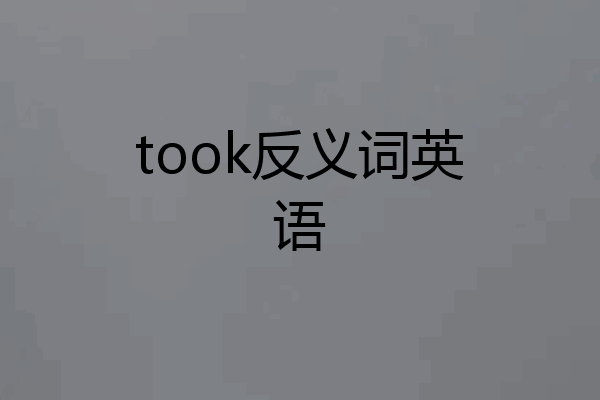
guokeren555
took 、spent 、cost 、 paid的区别是含义不同:took的原形是take ,作为“花费”解释,spent的原形是spend,主语是人,cost的原形也是cost,主语是物,paid的原形是pay ,主语是人,常与for连用。
一、读音不同
1.took
读音:英 [tʊk] 美 [tʊk]
2.spent
读音:英 [spent] 美 [spent]
3.cost
读音:英 [kɒst] 美 [kɔːst]
4.paid
读音:英 [peɪd] 美 [peɪd]
二、含义不同
1.took
释义:花费。
2.spent
释义:spend的过去分词和过去式,v.用,花(钱),花(时间)。
3.cost
释义:v.需付费,价钱为。
4.paid
释义:pay的过去分词和过去式,v.付费,付酬,交纳,偿还。
三、用法不同
1.took
用法:不能用钱,后面只能跟时间,(做)某事花了某人多少时间。
2.spent
用法:主语必须是人,在表示花费的时候,常常跟 on 和 doing(动名词)。
3.cost
用法:这个词用的时候,主语是“商品 或 服务”。
4.paid
用法:意思是支付,付钱,付账,结账,表示“为。。。付账”要用for。
近义词:expenses、expenditure、money spent
一、expenses
读音:英 [ɪksˈpɛnsɪz] 美 [ɪkˈspɛnsəz]
释义:n.费用,价钱,花钱的东西,开销,开支,花费。
例句:All expenses are to be equally divided between you and I.
译文:一切费用由我和你平均分担。
二、expenditure
读音:英 [ɪkˈspendɪtʃə(r)] 美 [ɪkˈspendɪtʃər]
释义:n.花费,消费,费用,开支,精力、时间、材料等的耗费,消耗。
例句:They should cut their expenditure on defence.
译文:他们应该缩减国防开支。


扬帆飘舟
take是动词原形 took是take的过去式 taken是take的过去分词 一般现在时中用take但后加不加s要看主语人称及单复数.如I ,you,we,they 接take 不加s .it ,she ,he 接take加s 一般过去时中用took,不管主语是什么 taken可用于被动语态中,前面要有be动词,类似于形容词成分. will,can,should等情态动词后接take原形,不管时态是什么.

吴晗晓美眉
take(took) 、spend(spent)、cost (cost )、 pay(paid)都是“花费”之意。其中spend、 pay要以人作主语,take 、cost 以物作。(括号里是指过去式)(1)spend的三种用法:spend on sth.例如:I spent150 yuan on the shirt.spend doing sth.例如:I spent 150 yuan buying the shirt.spend in doing sth..例如:I spent 150 yuan in buying the shirt.(2)pay……for……例如:I paid 150 yuan for the shirt.(3)cost:1.It cost sb.+some money +to do sth.例如:It cost me150 yuan to buy the shirt.2.某物+cost+sb.+钱 例如:The shirt cost me150 yuan .(4)take(指时间):It take sb.some time to do sth.

Arsenalzoe
(1) take off (脱下)-----反义词=put on (穿上)(2) take off (起飞)-----反义词=land on (着陆)take off 1.拿走, 取下; 去掉 2.脱去 3.截断, 切除 4.(使)离开 5.起跳; 起飞 6.(飞机)起飞 7.发起 8.使停运; 使停航 9.减轻(体重) 10.〈非正〉走开, 离开 1.拿走, 取下; 去掉 I can't take the lid off, it's stuck!这盖子卡住了, 我拿不下来。Help me to take this handle off.帮我把这握柄取下来。Last night's strong wind nearly took the roof off!昨夜的大风差一点把屋顶刮掉了。2.脱去 I can't take my boots off, they're so tight!靴子太紧了, 我脱不下来!3.截断, 切除 I'm afraid the disease can't be stopped, so we shall have to take your leg off.恐怕这病情控制不住了, 我们得把你的一条腿截肢。4.(使)离开 I'll take off now, and see you later.我现在就要走了, 回头见。The director has taken the visitors off to his office.经理把客人带到他办公室去了。I think I'll take myself off now.我想我现在就得走。5.起跳; 起飞 The tiger took off from the ground with a powerful spring.老虎从地上猛地一跃而起。Watch that bird taking off from the branch!注意看那只鸟从枝头飞起来!6.(飞机)起飞 It's exciting to feel the plane taking off.感觉到飞机起飞令人兴奋。7.发起 The attack will take off from our position near the harbor.此次攻击将从我们在港口附近的阵地上发动。8.使停运; 使停航 The early morning train is being taken off for the summer.早班火车夏季将停运。9.减轻(体重) I'm so pleased that I've been able to take off all that weight and get into my good clothes again!我的体重终于减轻, 那些漂亮的衣服又合身了, 我真高兴!10.〈非正〉走开, 离开 They took themselves off without saying good-bye.他们没有告辞就走了